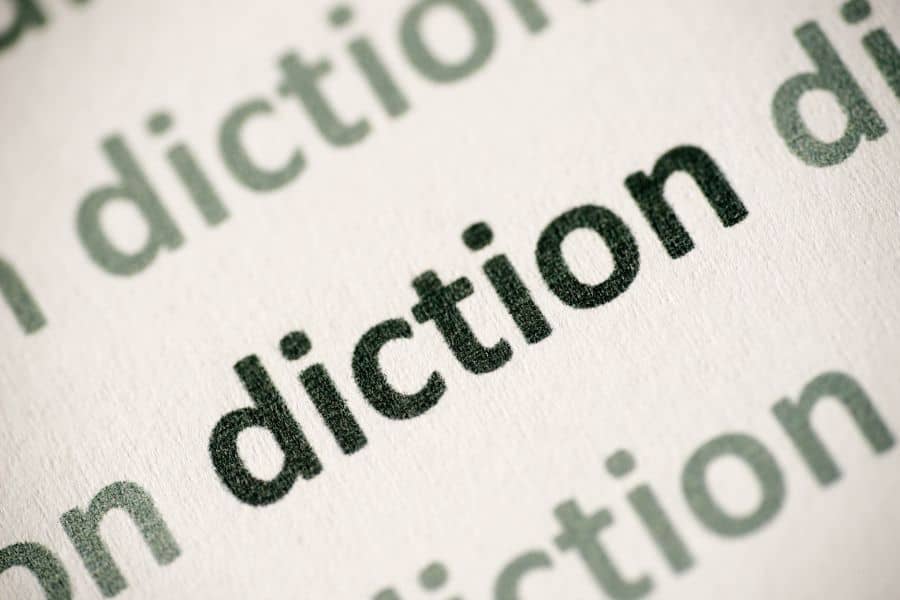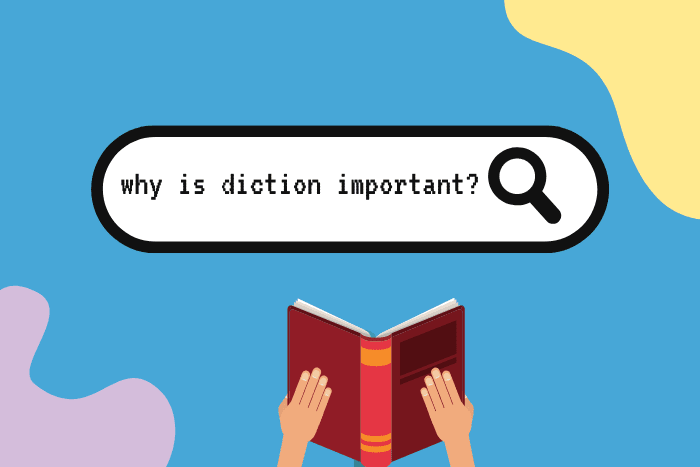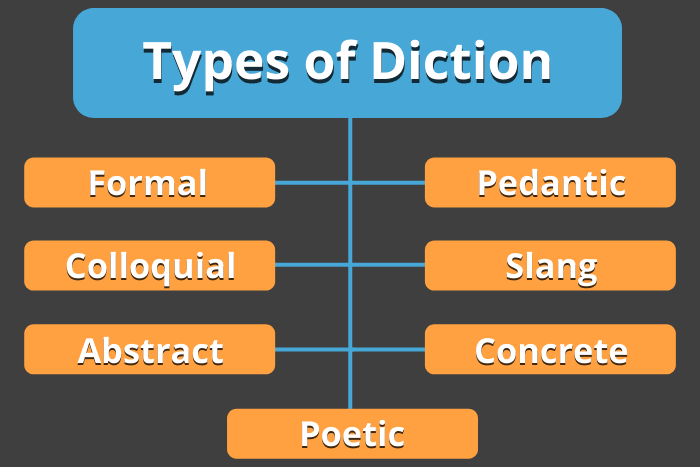Looking for diction examples to inspire your next writing project?
Ready to add some interest and flair to your prose?
While diction is a pretty straightforward literary element, seeing it in action makes it easier to understand.
That’s why we’ve come up with numerous examples to illustrate the varieties of diction and how it can enhance your writing.
By the time you finish reading this post, you’ll have a solid understanding of what diction is, the different types of diction, and how it can help you be a better writer.
Let’s dive in.

What is Diction?
Diction is a literary device used by writers to convey their message in a specific style and tone.
In other words, diction encompasses a writer’s distinct word choice, tone, and style.
You see, the style and tone of a story can change dramatically according to the writer’s choice in vocabulary — and we’ll see why that matters in a second.
Likewise, diction can also describe a style of writing particular to a writer.
For example, a fictional story set in Paris during WWII will have different diction than a story set in New York City in 2023.
Stephen King’s diction differs from John Grisham’s because they are writing for different audiences.
And even though Nora Roberts and Danielle Steel are both romance authors, their styles, or diction, are different because they each make word choices unique to the way they write.
What is the Purpose of Diction?

Diction is choosing your words with care to direct a story, establish a background, or set a tone.
A presidential speech will almost always have a formal tone.
Compare that to a webinar script where, even for an expensive product, it will come across as more casual (even as the speaker demonstrates authority on the topic).
Related Terms
Some literary terms are closely related to diction, but they mean different things.
For context, and to get a better understanding of diction, let’s review these terms.
Idiom
Idiom has two meanings.
Idiom is sometimes used as a synonym for diction, meaning the specific words a writer uses.
It can also refer to a phrase that has a different meaning than the words would imply.
Break a leg does not mean that someone literally wants you to break your leg.
Break a leg is an example of an idiom that means good luck.
Once in a blue moon doesn’t really refer to the moon turning blue.
It means something that happens infrequently.
Dialect
Dialects can be divided into two groups: regional dialect and social dialect.
Regional dialects refer to how people in different regions speak differently, while social dialects refer to how people from different social backgrounds speak differently.
An example of regional dialect would be the word y’all.
Though I haven’t lived in the south for almost 20 years, I grew up there, and I still use the southern dialect of y’all in my writing & speech.
My extended family in New York knows what I mean when I say y’all, but they’d never use the expression themselves. Being Northerners, they’d say you guys.
Another example:
Charles Dickens used social dialect to set a tone for his stories.
Take a peek at the quote below and note how Dickens wrote Sam Weller’s speech patterns to reflect his social standing in Victorian England.
Based on his dialect, can you guess if Sam was a wealthy person or someone from the working class?
From The Pickwick Papers by Charles Dickens:
“That’s the pint, sir. Out vith it, as the father said to the child, wen he swallowed a garden.”
If you guessed working class, you’re right!
See how Sam Weller’s Cockney dialect reveals his working-class background?
Jargon
Jargon is a type of language specific to a particular group or profession, like law, business, or medicine.
Outsiders find it more difficult to understand than normal language because they haven’t been exposed to the same vocabulary.
Now, when jargon becomes too difficult, it can alienate readers.
For example, if you’ve never started a blog or online business, phrases like click-through rate (CTR) or search engine optimization (SEO) might be puzzling. But once you’ve been blogging a while, those terms become a regular part of your vocabulary.
7 Types of Diction with Examples

Formal Diction
Formal diction word choices are very specific and proper.
For example:
In response to a request that you do something, formal diction might sound like, “I will address that issue right away.”
Alternatively, using informal diction, the response would be more casual like, “You got it.”
Both sentences mean the same thing, but they convey distinct tones.
Pedantic Diction
Pedantic diction is when a writer uses unnecessarily long words, a more complex sentence structure, or archaic words to show their intelligence.
This comes across as pretentious, making the reader feel like they’re being talked down to, and also making them less interested in what the writer has to say.
Sheldon Cooper of the hit sitcom The Big Bang Theory is an excellent example of someone using pedantic diction.
Here’s a glimpse of Sheldon’s pedantic diction in action:
Sheldon: “I’m writing an appeal to the faculty senate so that I can move on from string theory.”
Leonard: “How’s it going?”
Sheldon: You tell me. “Dear esteemed colleagues. As you may know, I have requested to change my field of study. My decision to do so is, I believe, in the best interest of science. At your convenience, I’d be happy to explain it to you in words you’ll understand.”
Colloquial Diction
Colloquial diction is the use of informal words or expressions associated with a specific region or time period.
Now, writers use colloquial diction because it helps a sentence sound more natural and relaxed — it also adds personality to dialogue, making it rich and memorable.
For example:
“She’s fixin’ to go to the store sometime soon.”
Fixin’ is a southern colloquialism that means getting ready.
For anyone not from the south, this sentence translates to:
“She’s getting ready to go to the store soon.”
Notice how the former sentence has more depth and personality than the latter sentence? Also, did you picture two completely different speakers? That’s the power of colloquial diction.
Slang Diction
Slang is a type of informal diction originating with one group of people that eventually makes its way into the greater lexicon.
Slang words tend to be generational and last only for a short period.
For example, slang from the 1970s, like far out or groovy for cool, is rarely heard today.
Some examples of current slang terms would be tea for gossip, shady for suspicious, or ripped for physically fit.
Abstract Diction
Abstract diction is the description of emotions or ideas.
Now, with abstract diction, you can use metaphors and other figures of speech to present concepts that may be difficult to understand.
To illustrate this, let’s look at the concept of love.
Love is intangible — you can’t describe its physical appearance and it doesn’t have features you can highlight. But, as a writer, you paint a picture of love with abstract diction.
For example, take these powerful words from Aristotle:
“Love is composed of a single soul inhabiting two bodies.”
See how something as abstract and intangible as love becomes more concrete and tangible?
Concrete Diction
Concrete diction uses detailed and specific words to vivid imagery for the reader.
For example, if you were telling someone about the dinner, you had at the new restaurant in town, you could say, “I had the steak.”
Or you could say, “I had the marinated flank steak, sauteed asparagus with aged gouda, and roasted fingerling potatoes. Then for dessert, we had butterscotch banana splits. It was amazing!”
Which description paints a more detailed image of your meal?
Poetic Diction
Poetic diction is the use of language to evoke a mood or feeling.
Specifically, poetic diction relies on repetition, alliteration, figurative language, and other devices to create an emotional response in the reader.
Although poetic diction is most often used in poetry, it can be found in other forms of writing, such as song lyrics, limericks, or even advertising copy.
The poem Up In a Swing by Robert Louis Stevenson is a good example of poetic diction.
“How do you like to go up in a swing,
Up in the air so blue?
Oh, I do think it the pleasantest thing
Ever a child can do!”
Examples of Diction in Literature

We can find many examples of diction in literature.
For example, look at Mark Twain’s The Adventures of Huckleberry Finn
“You don’t know about me without you have read a book by the name of The Adventures of Tom Sawyer; but that ain’t no matter. That book was made by Mr. Mark Twain, and he told the truth, mainly.”
Huck’s diction reflects his casual, boyish manner and lack of formal education. Notice how Twain uses diction to set a mood for the story?
Contrast that with Nick Carraway from The Great Gatsby by F. Scott Fitzgerald.
“He didn’t say any more, but we’ve always been unusually communicative in a reserved way, and I understood that he meant a great deal more than that. In consequence, I’m inclined to reserve all judgments, a habit that has opened up many curious natures to me and also made me the victim of not a few veteran bores.”
Nick has a far more formal way of speaking — it’s cultured and sophisticated and sets a very different tone for Fitzgerald’s story.
And then let’s look at To Kill a Mockingbird by Harper Lee.
“You just hold your head high and keep those fists down. No matter what anybody says to you, don’t you let ’em get your goat. Try fighting with your head for a change.”
While Atticus Finch normally has a more reserved manner of speech, when he is talking to his daughter, Scout, his tone and cadence change. He’s more relaxed speaking to her, using phrases like “get your goat.”
Final Thoughts on Diction Examples
Now that you’ve seen some examples of diction in literature and other writing, are you ready to add this literary device to your writing toolkit?
Great!
Whether you’re freelance writing for a client or writing blog posts for your own business, diction is a great way to add some life and variety to your prose.
Which type of diction will you try first?
The post 15+ Diction Examples for Any Voice and Style (Formal & Informal) appeared first on Smart Blogger.
from Smart Blogger https://ift.tt/Dan4Plv
via IFTTT
No comments:
Post a Comment